How Thyme Care Kept Members on Track and Out of the Hospital
“Janet saw me through all of that. She got me home, and I’ll never, ever, ever forget it.”
In August of 2021, Margaret Henderson found out she had acute leukemia. “My diagnosis came as a shock to me,” Margaret says, “I was frightened, even though no one knew it.” She started working with her dedicated Thyme Care Nurse, Janet, just four days after receiving her diagnosis. As a nurse at Thyme Care, Janet helps Thyme Care members with cancer understand their diagnosis, monitor symptoms, make informed decisions, and ultimately bridge any gaps in care, leading to improved outcomes and lower costs.
Only 12% of U.S. adults have the health literacy skills needed to navigate the complex healthcare system.
Janet knew that communication and understanding would be of the utmost importance to Margaret, who wanted to advocate for herself and her care, especially with her complex cancer diagnosis. Janet worked with Margaret to ensure she understood her diagnosis and treatment recommendations.
Margaret was identified by Thyme Box, Thyme Care’s care management software, as being at increased risk of experiencing adverse reactions during treatment and was therefore enrolled in Thyme Care’s Symptom Management Program. Members within this program are proactively identified and monitored throughout their treatment, allowing our Care Team to be able to quickly triage any concerns to the right support, avoiding unnecessary ED visits and hospitalizations.
Monitoring symptoms in cancer patients has been shown to reduce emergency department visits and hospitalizations by as much as 30%.
During a weekly check-in with Janet in November, Margaret noted a significant increase in pain, bruising, and swelling at her treatment injection site. Janet immediately recognized that there was a potential hematology issue, and that Margaret was at-risk of low platelets. Janet scheduled a same-day appointment with Margaret’s oncologist to check her platelet levels. The bloodwork confirmed that Margaret’s platelets were critically low, and she was in need of an immediate platelet transfusion. Janet scheduled an immediate infusion at the office.
However, that same day, Margaret was notified that she’d been exposed to COVID-19. Due to her physician’s office policies, she would have to get treatment at the emergency department. When she arrived, the staff was confused on where Margaret should receive her infusion and sent her back and forth between the emergency department and outpatient clinic. Margaret was tired, frustrated, and wanted to go home and get the infusion another day. “I was concerned, I was confused, I was everything,” she said. “I was crying so hard, and Janet walked me through it.” Given Margaret’s platelet levels—and that it was the day before Thanksgiving—Janet knew it was critical that she stay where she was to receive the transfusion. Low blood platelets in patients with acute leukemia can cause serious bleeding, putting Margaret at risk for a hospitalization or life-threatening complications.
Janet quickly coordinated a three-way call between the emergency department and Margaret’s oncologist to resolve the situation. After the call, Margaret was able to get her platelet infusion as an outpatient, saving her a costly hospital stay and keeping her treatment on track.
“Janet saw me through all of that. She got me home, and I’ll never, ever, ever forget it,” said Margaret.
Thyme Care partners with health insurance plans and providers to extend the reach of high-quality cancer care. Learn more about how Thyme Care is improving outcomes and lowering costs for health plans, providers and members: https://www.thymecare.com/health-plans

